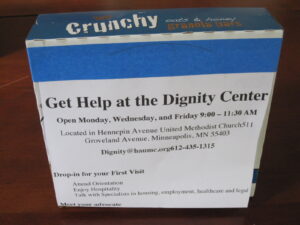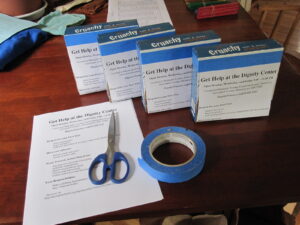Dear man at the corner with the cardboard sign:
You make me uncomfortable. Let me rephrase that. I feel uncomfortable when I pull up next to you in my relatively new Subaru Outback as I drive to our well-appointed home or to the coop where I purchase organic produce and lovingly-slaughtered animal flesh. I know that you need something. You say you’re a vet or that you lost your wife and son or you simply proclaim “Anything helps. God bless.”
As I rationalize turning my head away from you with a half-smile, a grimace really, I come up with all kinds of tales. You just want money for cigarettes or booze. You aren’t really a vet. I could ask where you served, for how long, in which capacity. So when did your wife die? Was it cancer? A car accident? Did you kill her?
Am I trying to guarantee the quality of your character before sinking a dollar into your cause? Tell me this please: Why are you(*) at nearly every freeway exit these days? When I was in gradeschool, my mom and I drove past a woman standing with her children at a street corner. “Hungry. Anything helps.” Mom was so distressed that we rushed home, packed a grocery bag full, and returned to deliver the food. My mom could now spend her entire life going corner to corner.
I discussed this issue with a friend who said she’d heard that many of the people on street corners are employed/manipulated/exploited by some shady mafia-like angency. I said gee, that sounds like salve for our nouveau bourgeois hippie conscience. Would you be there asking for “anything helps, God bless” if you could perceive any other workable option?
I came to a conclusion. I won’t give you money. I can’t stand the idea of contributing to addiction. Trader Joe’s sells a box of twelve granola bars for $1.98. I gave away the first box a few days back with a note taped to it about the Dignity Center. You took the box and said, “Bless you.” I said, “Have a nice day.” without registering the inanity of those words.
The second box is gone, too. Another version of you stopped me at the Farmer’s Market, said you have a $49 copay on your prescriptions. I told you about the Dignity Center, how you can get medical, legal, and housing assistance. (Watch the carbs in those granola bars.)
My gift to you is pitifully small, one drop of water on a five-alarm fire. But I’ll continue to give it freely. You have a need. I have a granola bar. And a potential first step toward a different future.
Bless you, too.
Anne
* Yes, I know “you” are not a homogeneous group. Hang in there with me anyhow.



Yeah, if I’m going to err, I try to err on the side of generosity—I’d rather be taken for a fool than taken for someone who doesn’t care.
In Matthew 5:42, Jesus says, “Give to the one who begs from you, and do not refuse the one who would borrow from you.” [I don’t believe in a god, but I do find a lot of useful tips about how to be human in religious stories.]
Of course, WHAT you give is your choice: I like your granola bars and flier! Other people I know keep new socks in their cars to hand out–one friend gave anyone who asked a fresh orange!
You probably know the story C. S. Lewis’s stepson Douglas Gresham tells of Lewis giving money to a someone on the street?
The friend Lewis was with said, “You shouldn’t have done that, Jack. He’ll only spend it all on drink.”
Lewis replied, “Well, that’s what I was going to do.”
Great musical moment–I really like that you include those!
P.S. I laughed at your friend’s suggestion that people asking for money under the freeway are “exploited by some shady mafia-like agency”
–does she mean… Capitalism? 🙂
nicely played, Francesca… I agree – regardless of one’s belief system, religious texts often have good suggestions for how to be a decent human being.
Blessing Bags, Care Packages, Gift Certificates – are all nice things to give to a person with a sign on an exit/entrance ramp. Here is a helpful post from a person claiming to be homeless: http://aiffe.tumblr.com/post/48916125483/chainofaffection-have-you-ever-come-across-a
Seems legit. It squares with what I have learned over the years volunteering at Simpson House. The tumblr post also gets to the heart of the matter. It is not easy to alleviate how we feel about the homeless. I think that is a good thing. Homelessness is solvable but we as a society lack the collective will to end it. So we feel a gnawing at our gut when confronted by its persistence.
Julie Manworren, former Executive Director of Simpson Housing Services, told me a good thing to do when coming up to a person on an exit ramp is to talk to them. Be honest with them. Say hello. Ask them how their day is going. If you don’t want to give them money, tell them you don’t have any money to give them but you’d like to say hello.
The most immediate, useful thing for them to have may be money but giving them love and compassion will always be of use.
How do we ramp up our “collective will to end it?”
Scott usually has a box of granola or cereal bars in the car to give to people asking for help. I do sometimes too. It makes me feel better to do *something* that could be helpful without feeding an addiction.
Wow, Anne–because of your post, this morning I finally actually looked up Tolstoy’s What Then Must We Do? (I only knew of it before from the movie The Year of Living Dangerously).
You’ve read it, right? I never have.
Right away I found all the questions you’re posing:
CHAPTER I
“I had spent my life in the country, and when in 1881 I came to live in Moscow the sight
of town poverty surprised me.
….
“I learned that among this class [beggars] too there are many cheats; but I was very
sorry for these cheats; they were a half-clad, poor, thin, sickly folk: the kind of people
who really freeze to death or hang themselves, as we learn from the papers.”
I only just skimmed it this morning, and there’s lots of amazing stuff like this:
“Great and real affairs are always simple and modest.
And so it is with the most important affair before us: the solution of the terrible
contradictions amid which we live.
“And the things that solve those contradictions are these modest, imperceptible, apparently ridiculous acts: serving oneself, doing physical labour for ourselves and if possible for others – which we rich people have to do if we understand the misfortune, wrongfulness, and danger of the position into which we have fallen.”
This ^ all sort of reminds me of working at the Thrift Store (“modest, imperceptible, apparently ridiculous” work), which you and your parents do so beautifully!
Sadly, Tolstoy’s godawful about women, especially those who shirk their God-given work of having as many children as possible !
The whole thing is online here:
http://arvindguptatoys.com/arvindgupta/whatthenmustwedo.pdf
P.S. Gosh, rummaging around on the ‘nets this Sunday morning, I see there’s a new book with that title too–maybe you already know it?
What Then Must We Do?: Straight Talk about the Next American Revolution by Gar Alperovitz.
http://whatthenmustwedo.org
I haven’t read it yet of course, but I think I will.
He also wrote this interesting article: “What Then Can I Do? Ten Ways to Democratize the Economy”.
http://www.garalperovitz.com/what-then-can-i-do
I love the thought of Steeple People as a Socialist activity. Or perhaps anarchic pacifist activity…